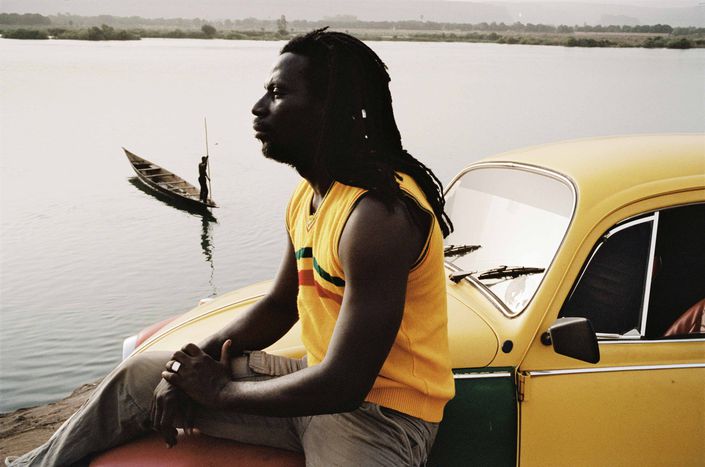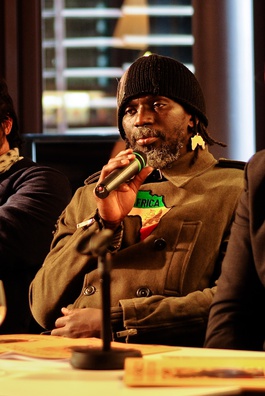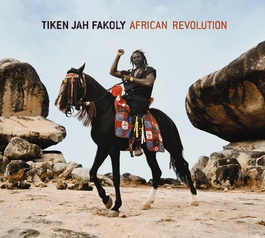
Tiken Jah Fakoly: ‘Africa has to overcome its ethnic and religious issues’
Published on
Translation by:
Cafebabel ENG (NS)The Ivorian roots-reggae singer is in Paris to promote an upcoming African solidarity week in June, but also to create an echo of the Tunisian people’s fight across the rest of the African continent
Tiken Jah Fakoly is mostly known for the political engagement in his reggae music, insulting outgoing president Laurent Gbagbo and refusing to sing for his opponent Alassane Ouattara. His positions have already cost him exile from his native Ivory Coast, but he remains a spokesman for young Africans. His most recent album African Revolution saw him shaking up the codes of Jamaican reggae by adding more African sounds and pointing out the importance of education. As if his musical commitment weren’t enough, Jah Fakoly is also part of the One Concert, One School project which sees the money raised for his French concerts going to build schools in Africa.
18 June appeal
 ‘The African solidarity week in Paris is an opportunity to speak about Africa and show the positive side of the continent,’ he explains. ‘If we Africans don’t do that no-one will do it for us.’ He adds that this is an important event in his career, and many artists are due to join him onstage at his concert at the Bercy stadium in southeastern Paris on 18 June, including Nigerian artist Asa and the French rapper of Comorian descent Soprano. The concert takes place in the same week as the Africa events, which are being organised in partnership with Paris's Quai Branly, the national museum of African, Asian and non-European art, the MK2 cinema and radio France Inter. There will also be a photo exhibition, screenings of African films and a short-term shop, as well as various conferences and debates.
‘The African solidarity week in Paris is an opportunity to speak about Africa and show the positive side of the continent,’ he explains. ‘If we Africans don’t do that no-one will do it for us.’ He adds that this is an important event in his career, and many artists are due to join him onstage at his concert at the Bercy stadium in southeastern Paris on 18 June, including Nigerian artist Asa and the French rapper of Comorian descent Soprano. The concert takes place in the same week as the Africa events, which are being organised in partnership with Paris's Quai Branly, the national museum of African, Asian and non-European art, the MK2 cinema and radio France Inter. There will also be a photo exhibition, screenings of African films and a short-term shop, as well as various conferences and debates.
 ‘We’ve only been independent for fifty years after centuries of slavery and colonalisation. But we’ve only received a photocopy of independence. Today we want to claim the original document: we want to be independent politically as well as economically. Independence isn’t given, it is gained.’ Tiken Jah is adamant that education is the basis of development. He regularly puts the royalties from his gigs into the construction of schools in Africa. ‘Only educated people can understand the rights they have.’
‘We’ve only been independent for fifty years after centuries of slavery and colonalisation. But we’ve only received a photocopy of independence. Today we want to claim the original document: we want to be independent politically as well as economically. Independence isn’t given, it is gained.’ Tiken Jah is adamant that education is the basis of development. He regularly puts the royalties from his gigs into the construction of schools in Africa. ‘Only educated people can understand the rights they have.’
'God is very busy and if we want his help, we have to help ourselves first’
The Ivorian singer has lived in exile in Mali since 2003 after having received death threats, and it hasn’t stopped him from speaking about what’s happening in his own country. ‘There was a televised debate for the first time in the Ivory Coast about the November elections. The political parties presented their programmes. People wanted change and that’s why the participation rate in the first round of the elections was so high. Unfortunately the situation deteriorated. I just want to pass on the message that the voice of the people must be absolutely respected. People like to say that god is great in Africa, that everything’s going to be fine,’ continues Tikeh Jah. ‘But I maintain that god is very busy and if we want his help, we have to help ourselves first.’ He refers to the streets protests in Tunisia which helped bring down the dictator president Ben Ali in December 2010. ‘People fought and won in Tunisia, but if Africa wants to do something it has to overcome its ethnic and religious issues.’
Catch Tiken Jah Fakoly in concert on 18 June at Paris Bercy; African solidarity week takes place between 13 and 18 June
Images: main courtesy of Tiken Jah Fakoly; in-text of Tiken Jah Fakoly ©Sladjana Perkovic
Translated from Tiken Jah Fakoly : «La voix du peuple doit être respectée !»



